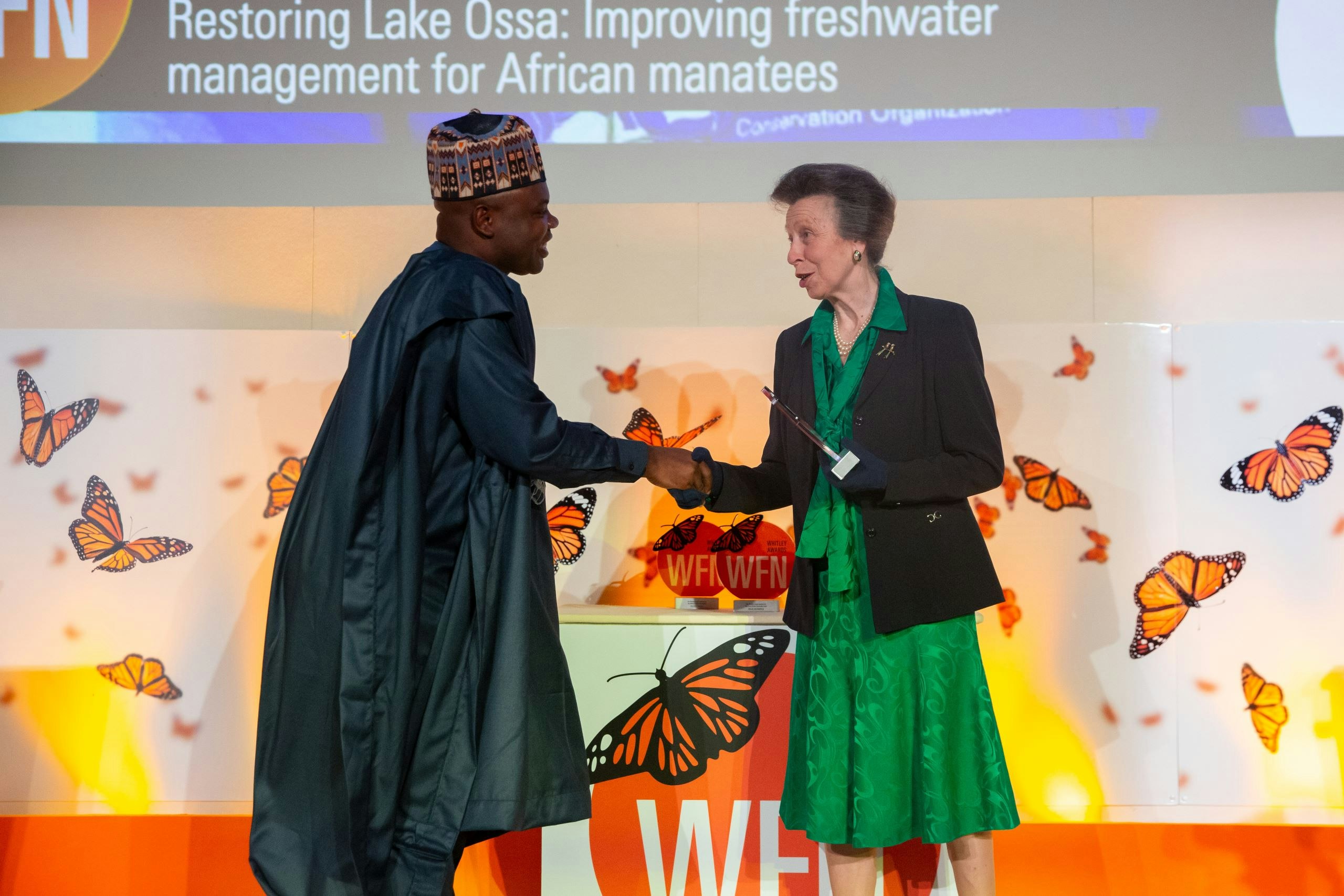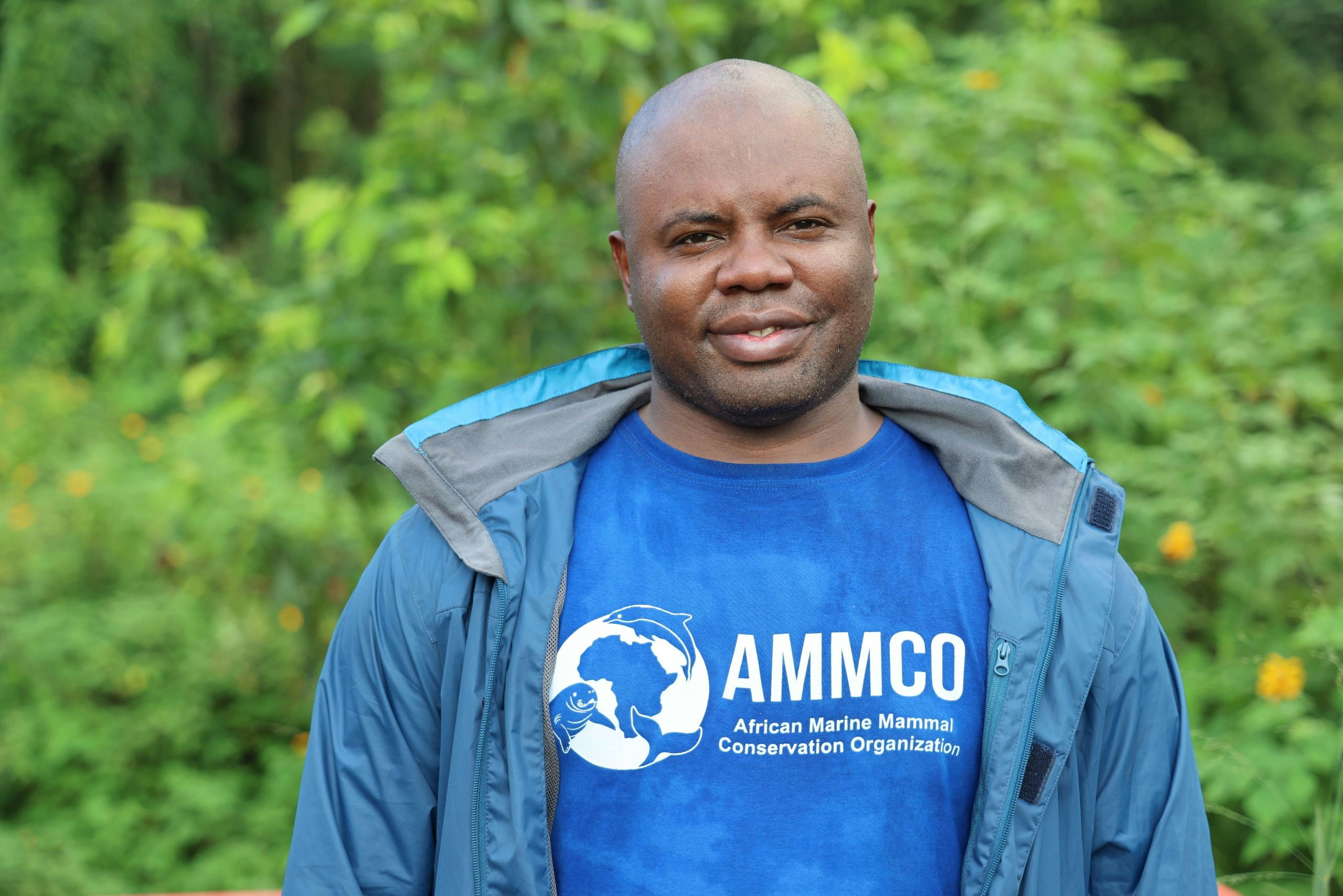
UK charity the Whitley Fund for Nature (WFN) recognises Aristide Kamla from Cameroon with a Whitley Award for his landmark work to restore the habitat of the African manatee in Lake Ossa.
Charity Patron, HRH The Princess Royal, presented the Whitley Award on 1 May at the Royal Geographical Society in a ceremony that marks three decades since the very first Whitley Award was presented and 25 years since the Princess’ involvement as Patron. The event was livestreamed to YouTube.

“Giant Salvinia forms a thick carpet on top of the water surface that prevents the manatee from coming to the surface to breathe. Manatees need to surface every five minutes.”
Founder and CEO of the African Marine Mammal Conservation Organization, Aristide and his team used biological control to clear most of the Salvinia molesta plant species from Lake Ossa, one of Cameroon’s largest lakes and a designated wildlife reserve. Introducing a natural predator, the salvinia weevil, they shrank the invasive weed back by more than 70 percent. Aristide is now working to identify the source of the nutrient pollution that fuelled the outbreak which covered half the lake’s surface in 2021. The marine scientist has become the country’s foremost specialist in the mammal, addressing threats to its freshwater habitat from rapidly expanding invasive species and pollution.
Sir David Attenborough, WFN Ambassador and a long-term supporter of the charity, said the growing network of winners represent some of the best conservation leaders in the world: “Whitley Award winners combine knowing how to respond to crises yet also bring communities and wider audiences with them.”
The African manatee inhabits the Atlantic coastal waters of 21 African countries stretching from Mauritania to Angola. One of three manatee species which include the Amazonian manatee and West Indian manatee, the African manatee also faces threats from poaching and entanglement in fishing nets. Aristide worked closely with the local fishers in the first study of manatees in Lake Ossa, a biodiversity hotspot which supports about 17,000 people, including more than 300 fishers. Globally, freshwater species have fallen by 83 percent since 1970, the largest decline of any species group according to the most recent Living Planet report.
Aristide’s work aims to address how poor management of the watershed upstream affects aquatic ecosystems and livelihoods downstream. Pollution from human activities is a significant threat to the manatee. Agricultural activities as well as the construction of dams, contribute to nutrient enrichment in the lake.
“When we started, salvinia coverage was 50% of the lake’s surface. Today, it’s brought down to less than 10%, and we are now seeing more manatees.”
Aristide, who received a Fulbright scholarship to pursue his doctoral studies at University of Florida, was the first to use biological control in Cameroon to combat invasive plant species within a manatee habitat, collaborating with the Cameroonian government and local stakeholders. At least 3,500 harmful invasive species have been recorded globally in every region of the world, a UN report said last year. Aristide’s solution to Lake Ossa’s problem involved importing the initial batch of weevils from Louisiana State University to release into the lake.
Actively engaging the local community – inviting people to witness weevils feeding on the invasive plants – helped inspire trust in Aristide’s work. Education on how the manatee is a crucial sentinel within water ecosystems was key. Manatees prevent overgrowth in fish habitats by grazing on submerged plants. They excrete nutrient-rich faeces which fertilize the water and seagrass beds which contribute to water quality, carbon sequestration and shoreline stability.
Aristide’s NGO has since trained a network of fishers who voluntarily report sightings of marine mammals. Using their mobile application, SIREN, they have collected data around more than 20,000 sightings.
With his Whitley Award funding, Aristide plans to continue to reduce Salvinia coverage in Lake Ossa; identify the main sources of nutrient enrichment in the lake through water quality monitoring campaigns. His team, in collaboration with Rainforest Connection, will deploy an acoustic sensor system to detect and deter artisanal logging activities on the islands of the lake and the riparian forest bordering it, as well as support local fishers to develop fish farming to reduce their impact on the lake and enable recovery of this freshwater ecosystem,
Aristide plans for a healthy population of African manatees to attract more tourists to the area. The lake comprises three interconnected lakes and is a thriving wetland complex of manatees, freshwater turtles, crocodiles and mona monkeys. Aristide has initiated a scientific and cultural festival called Street Manatee to gather stakeholders, including government representatives, traditional leaders, fishers, universities, researchers, private sector representatives, and donors to address aquatic ecosystem management.
HIGH-RES IMAGES AVAILABLE HERE
NOTES TO EDITORS – WHITLEY FUND FOR NATURE
The Whitley Fund for Nature (WFN) is a UK charity supporting grassroots conservation leaders in the Global South. Over 30 years it has channelled £23 million to more than 200 conservationists across 80 countries.
An early pioneer in the sector WFN was one of the first charities to channel funding directly to projects led by in-country nationals. Its rigorous application process identifies inspiring individuals who combine the latest science with community-based action.
WFN’s flagship prizes – Whitley Awards – are presented by charity Patron, HRH The Princess Royal, at a prestigious annual ceremony in London at the Royal Geographical Society (RGS). Winners receive funding, training, and profile boost, including short films narrated by WFN Ambassador Sir David Attenborough.
- The 2024 Whitley Awards Ceremony is on Wednesday 1 May at the RGS and streamed live to YouTube from 8pm BST. The 2024 Whitley Award winners are:
- Fernanda Abra from Brazil who is pioneering the use of low-cost canopy bridges over highway BR-174 in the Amazon rainforest to restore connectivity for tree-dwelling mammals and save them from road collisions
- Naomi Longa from Papua New Guinea who is safeguarding coral reefs in Kimbe Bay and creating a network of marine protected areas led by local indigenous women
- Kuenzang Dorji from Bhutan who is protecting Endangered Gee’s golden langur and implementing solutions for farmers whose crops the primates are targeting
- Leroy Ignacio from Guyana who is leading an expansion of one of the country’s first indigenous-led conservation movements to protect the Endangered Red siskin finch
- Raju Acharya from Nepal who is bolstering protection for owls in central Nepal after spearheading a government-backed 10-year plan to safeguard the birds
- Every year, a past Whitley Award winner is chosen to receive the Whitley Gold Award, worth £100,000, in recognition of their outstanding contribution to conservation. Joining the Judging Panel, the Whitley Gold Award recipient also acts as a mentor to Whitley Award winners and an international ambassador for conservation success. The 2024 Whitley Gold Award winner is India’s Purnima Devi Barman, recognised for catalysing a movement of tens of thousands of women in Assam to save the greater adjutant stork.
- whitleyaward.org, Facebook, Twitter, Instagram, YouTube, LinkedIn
FOR INTERVIEW REQUESTS AND INFORMATION, CONTACT:
Carol Roussel, Head of Media Relations, Whitley Fund for Nature
T: 07379 019 804
Kate Stephenson, Head of Communications, Whitley Fund for Nature
T: 07460 136 571


